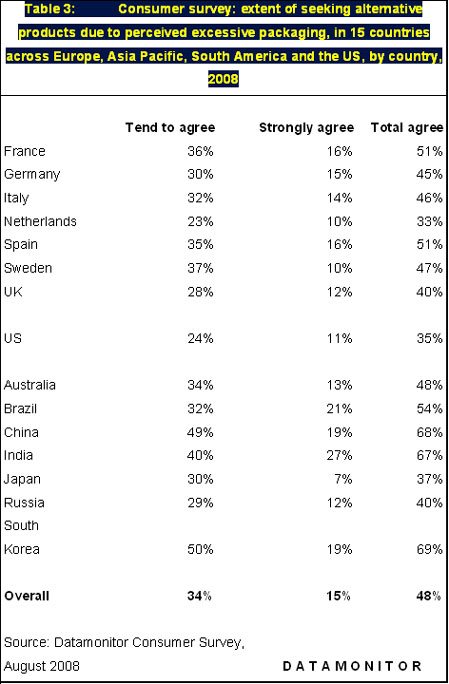Sustainable packaging is one of a growing number of issues driven by ethics, economics and environmentalism. Economic imperatives, as well as possible greater regulation, mean that more brands need to consider adapting their present approach to accommodate sustainable packaging, comments Matthew Adams**, consumer analyst at Datamonitor and author of the report.
Although it is universally recognized that the global economic recession is having a negative impact on countries and individuals, it may result in some consumers changing their lifestyles for the better. While recession means that consumers often have to act in a more self-serving manner, for instance buying fewer Fairtrade groceries, many of the recession-inspired consumer behaviours could be said to be beneficial for the environment.
Recession makes everyone act more efficiently and, as fewer purchases are made, there is potentially less waste. Rising fuel costs have also made numerous consumer packaged goods companies question their current practices and seek cost savings by reducing packaging in order to cut the amount of weight that is transported from factory, to shop, to end consumer. However, producers must continue to protect products throughout their lifecycle, while making credible adjustments to packaging that benefit all.
The results of Datamonitor's consumer survey in the second half of 2008 show that, in the UK, 39% of consumers feel that packaging design has a medium or high level of influence over their choice of food and drink products. However, of this proportion, only 9% felt that it exerted a high level of influence on their purchases. Few consumers will admit to the influence that packaging has on their decision-making process, as it is often taken for granted. However, increasing consumer concern about ecological matters means that packaging is an issue that is rising to prominence.

Of the 15 countries surveyed by Datamonitor, the UK had the greatest proportion of survey respondents showing high levels of concern about the packaging of products in the household goods market. Of course this does not necessarily mean that UK consumers are the most ecologically minded—it could be that household goods in the UK are packaged less efficiently than in other countries (or that consumers believe this to be the case), or that media influence is driving these concerns. Regardless, this is a threat to unresponsive producers in the household goods market: consumers may react to continued excessive packaging with their own proactive, pre-emptive methods.

One of the most obvious methods that consumers can use to bring about change is to boycott products that do not meet their requirements or expectations. With this in mind, in 2008 Datamonitor surveyed consumers from around the world to see how many claim to have changed their buying behaviour due to concerns about excessive packaging. In 2008, 40% of UK respondents agreed that they seek alternative products if they believe their first choice to be packaged excessively. This is a slightly higher proportion than in the US, but lags behind other European countries such as France, Spain and Sweden. In the Netherlands, consumers are less likely to boycott products than in the UK.

With this in mind, all consumer packaged goods companies should continue to evaluate their packaging in order to align themselves with an emerging consumer trend. Sustainable packaging would not only benefit the environment but also manufacturers and consumers. Updating packaging can also be a more credible way to make cost savings than using methods such as ‘package shrink' or more accurately ‘portion shrink', where a smaller amount of the product is sold at the same price.
*Datamonitor's report Sustainable Packaging Trends: Consumer Perspectives and Product Opportunities was published in April 2009.
**Matthew Adams, is consumer market analyst at Datamonitor and is the author of the study.
Article courtesy of www.datamonitor.com